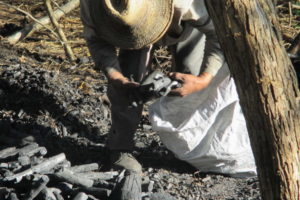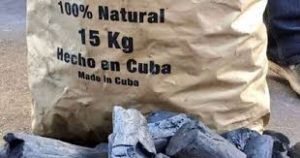
The state-owned company CubaExport closed a second contract in Havana yesterday to sell Cuban handmade charcoal in the United States.
The agreement was made with the North American company Coabana Trading LLC and will allow the export of another 40 tons of this product.
The president of the company, Craig J. Litherland, explained that the relations between both parties are growing and are going in the “right direction” and he was also optimistic about the prospects of these acquisitions and expressed his desire to extend them to other products such as coffee and honey.
Under a similar agreement, Cuba sent two containers with 40 tons of marabou charcoal to the United States in the first export of a product from the Caribbean island to that country in more than half a century.
That cargo of marabou coal, valued at $ 16,800, was shipped from the western port of Mariel on a vessel of the Crowley Latin America Services Company to the US port of Everglades, Florida, Cubaexport reported at the time.
The general director of CubaExport, Isabel O’Reilly, said Wednesday that the new agreement on Wednesday represents an “indication of acceptance” of the product in the US, where Cuba intends to open this type of sale with another customer and increase shipments to that destiny.”They (Coabana Trading LLC) have not had difficulties for the import nor we to have the payment,” said the directive of the Cuban company.
O’Reilly said that this time the supply of the charcoal purchase “Roturado de Marabú” will be made, like the previous one, in two containers bound for Florida, and that the first of them will be shipped in December.
This new deal was signed at the 35th International Fair of Havana and amid the tension currently being experienced by diplomatic relations between Cuba and the US after the appearance of mysterious “acoustic attacks” that Washington claims have affected the health of 24 officials his embassy in Havana.
The process of Cuban charcoal for export begins in the private agricultural cooperatives that cut down and process the marabú, a shrub of African origin considered an invasive species on the island, and then sell it to another company that prepares it for final commercialization.
The charcoal of marabú is attributed a high caloric and energetic power, it is produced in artisanal kilns in a natural way and its production does not constitute a cause of deforestation.
The company CubaExport is in charge of the sale, the procedures and the exit of the coal country, which is marketed by the firms Cimex, Citricos Caribes and Alcona. The leading Cuban company in the export of coal from Marabú is the Agroindustrial Ceballos, which in the last eleven years has produced 204,323 tons of this product for the international market, according to recently released figures.
Cuba annually exports some 80,000 tons destined mainly to European countries such as Greece, Spain, Portugal and also to Saudi Arabia, Syria, Turkey and Israel.
CUBA CIERRA SEGUNDO CONTRATO DE VENTA DE CARBON VEGETAL A ESTADOS UNIDOS.
La empresa estatal CubaExport cerró este miércoles en La Habana un segundo contrato para vender carbón vegetal artesanal cubano en Estados Unidos.
El acuerdo se llevó a cabo con la compañía norteamericana Coabana Trading LLC y permitirá exportar otras 40 toneladas de este producto.
El presidente de la empresa, Craig J. Litherland, explicó que las relaciones entre ambas partes se encuentran en crecimiento y van en la “dirección correcta” y además se mostró optimista con las perspectivas de estas adquisiciones y manifestó su deseo de que se extiendan a otros productos como el café y la miel de abejas.
En virtud de un convenio similar, Cuba envió en enero pasado hacia Estados Unidos dos contenedores con 40 toneladas de carbón vegetal de marabú, en la primera exportación de un producto de la isla caribeña realizada a ese país en más de medio siglo.
Aquel cargamento de carbón de marabú, valorado en 16.800 dólares, fue enviado desde el puerto occidental cubano de Mariel en una embarcación de la Compañía Crowley Latin America Services al puerto estadounidense de Everglades, en Florida, según informó entonces Cubaexport.
La directora general de CubaExport, Isabel O’Reilly, indicó este miércoles que el nuevo acuerdo de este miércoles representa un “indicativo de la aceptación” del producto en EEUU, donde Cuba pretende abrir este tipo de venta con otro cliente y aumentar los envíos a ese destino.
“Ellos (Coabana Trading LLC) no han tenido dificultades para la importación ni tampoco nosotros para recibir el pago”, señaló la directiva de la empresa cubana.
O’Reilly precisó que esta vez el suministro de la compra de carbón vegetal “Roturado de Marabú” se hará, al igual que la precedente, en dos contenedores con destino a la Florida, y que el primero de ellos se embarcará en diciembre.
Este nuevo trato fue rubricado en la 35 Feria Internacional de La Habana y en medio de la tensión que atraviesan actualmente las relaciones diplomáticas entre Cuba y EEUU tras la aparición de unos misteriosos “ataques acústicos” que Washington asegura han afectado la salud de 24 funcionarios de su embajada en La Habana.
El proceso del carbón vegetal cubano para la exportación comienza en las cooperativas agropecuarias privadas que talan y procesan el marabú, un arbusto de origen africano considerado una especie invasora en la isla, y luego lo venden a otra empresa que lo prepara para su comercialización final.
Al carbón vegetal de marabú se le atribuye un alto poder calórico y energético, se produce en hornos artesanales de manera natural y su producción no constituye una causa de deforestación.
La empresa CubaExport se encarga de la venta, los trámites y la salida del país del carbón, que es comercializado por las firmas Cimex, Cítricos Caribes y Alcona. La empresa cubana líder en la exportación de carbón de Marabú es la Agroindustrial Ceballos, que en los últimos once años ha producido 204.323 toneladas de este producto para el mercado internacional, según cifras difundidas recientemente.
Cuba exporta anualmente unas 80.000 toneladas con destino principalmente a países europeos como Grecia, España, Portugal y también a Arabia Saudí, Siria, Turquía e Israel.
Agencies/EFE/CiberCuba/Internet Photos/Arnoldo Varona/TheCubanHistory.com
THE CUBAN HISTORY, HOLLYWOOD.








